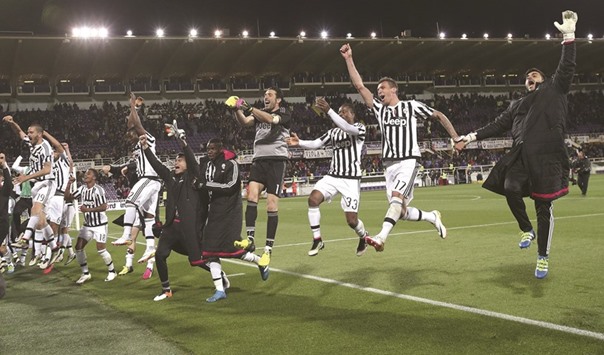There was not a lot of title talk to be heard in Turin on the morning of 29 October. Juventus had lost 1-0 away to Sassuolo the night before and, 10 games into the new season, found themselves adrift in the bottom half of the table. They were already 11 points behind the league leaders, Roma.
“Is this even Juve?” demanded the front page of Tuttosport, whilst Gazzetta dello Sport pondered the symbolism of this defeat.
Massimiliano Allegri had been fired as Milan manager in 2014 following a loss in Sassuolo, and now the pink paper asked whether his hopes of winning back-to-back titles with Juventus had died at the hands of the same opponents. Never in the history of Serie A had a team won the scudetto after starting so poorly. Juventus had 12 points to show for their opening 10 games – their lowest tally at that stage since the introduction of three points for a win.
Even Allegri was losing patience. He had responded to early setbacks with characteristic calm, tweeting in the wake of an opening day defeat to Udinese that “Serie A is a marathon, not a 100m final”, but after the loss to Sassuolo he became more candid – stating that “an immediate change of attitude” was required. He took his players away from their families for the rest of the week on a training retreat.
Did that act galvanise Juventus? Or did their luck simply turn? Three days later, the Bianconeri hosted Torino in the Derby della Mole. The score was 1-1 after 90 minutes, but deep into injury time Juan Cuadrado stole a winner, scuffing the ball clumsily over the line. In doing so, he launched one of the greatest comebacks in the history of Italian football.
Including that win over Torino, Juve have won 24 out of their last 25 league games. The only exception was a draw away to Bologna. To frame that another way: they have taken 73 points out of 75 available. Little wonder that nobody else in Serie A has been able to keep pace.
Hundreds of fans had gathered outside the gates of Juventus’s Vinovo training ground on Monday afternoon, and the celebrations began in earnest as word of Nainggolan’s goal reached them. The first-team squad was still in the changing room after a light practice session, but soon emerged in commemorative T-shirts to share their champagne with supporters. The party went on for hours. Predictably, it got a little bit messy. Allegri was drenched in booze and then thrown up in the air by his players.
Paul Pogba hit the deck whilst attempting to dance, sing and take a selfie all at once. Gigi Buffon stood in front of a mirror and puffed on an enormous cigar.He had earned it. No one player has done more than Buffon to keep his team on track this season. In the wake of that October defeat at Sassuolo, it was he who stood up before his team-mates in the changing room and declared their efforts thus far to have been unacceptable. “Lads,” he said. “At 38 years old, I’m not interested in going around just to make myself look shit.”
His leadership was fundamental, but so were his saves. It is no exaggeration to say that this has been one of the finest seasons of Buffon’s already stellar career. Besides shattering Sebastiano Rossi’s record for longest sequence without conceding a goal in the Italian top flight, he has posted a save percentage that is second only to Paris Saint-Germain’s Kevin Trapp across Europe’s top five leagues. Clearly, though, this title has been a team effort. Among the many outstanding aspects of Juventus’s current run is that it has been achieved despite injuries and suspensions to key players, from Giorgio Chiellini to Claudio Marchisio and Sami Khedira. The depth of this squad, able to bring a player as good as Álvaro Morata off the bench to score the winning goal against Fiorentina on Sunday, is exceptional.
This despite bidding farewell to Carlos Tevez, Arturo Vidal and Andrea Pirlo last summer – not to mention Fernando Llorente. We can hardly be surprised that Juventus struggled early on; those players accounted for more than half of their goals last season. What has been astonishing has been to see Allegri’s team eventually grow even stronger than they were before the summer renewal.
Juve are under no financial pressure to sell, and the club’s general manager, Beppe Marotta, has stressed that no starters will depart unless they ask to do so. Thus far we have no indication that Pogba, or any other member of Allegri’s first XI, is especially keen to do so. And why should they be? These players believe they are ready to challenge for more than just domestic honours. Last season’s run to the Champions League final came as a surprise even to many people at Juventus, but to have come so close to toppling Bayern Munich in March, with a remodelled side, has only strengthened the conviction within the club.
It was noteworthy that several players brought up the competition, and their desire to go further in it next year, unprompted during the interviews that accompanied Monday’s victory celebration. As Gazzetta dello Sport observed, it is “no longer a promise, but a logical premise that this team will assault the pinnacle of European and world football.”

Juventus’ players celebrate at the end of the match against Fiorentina.
